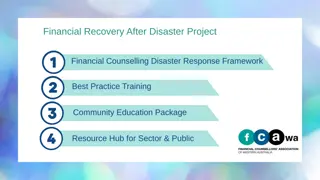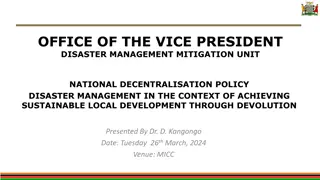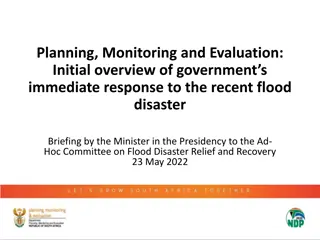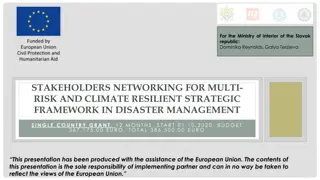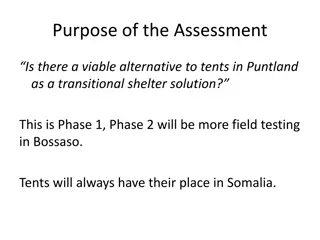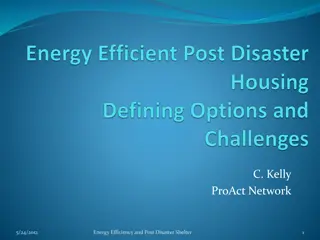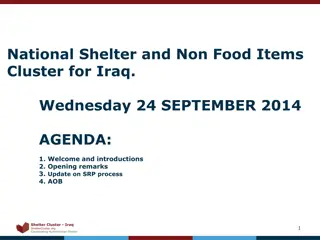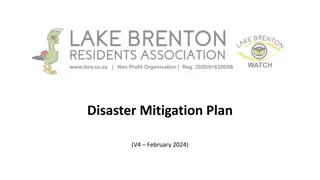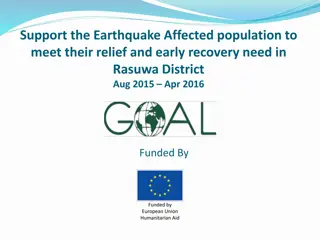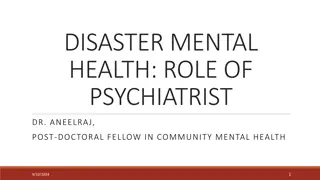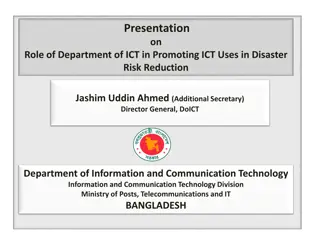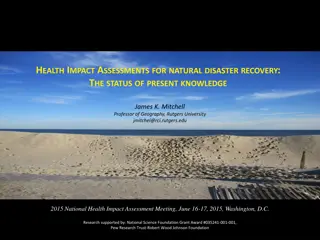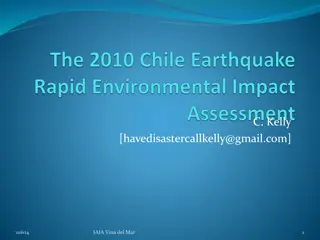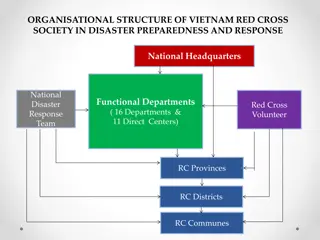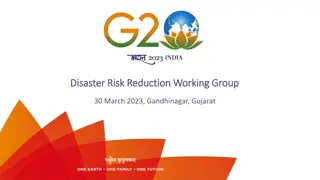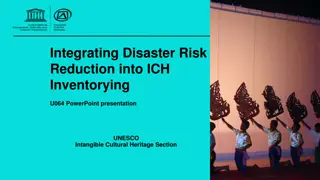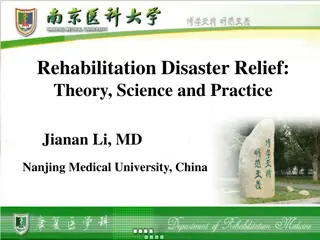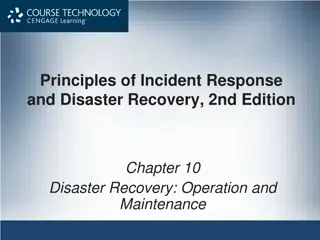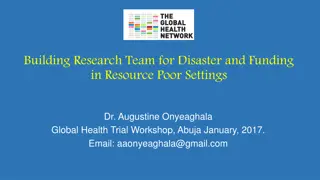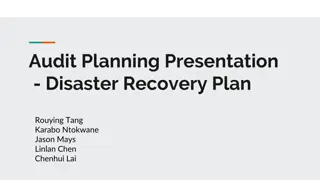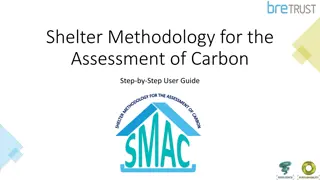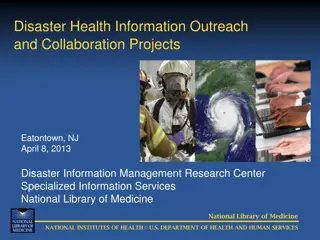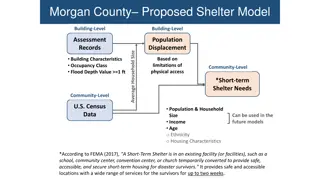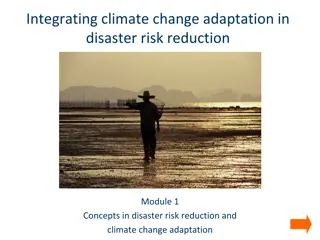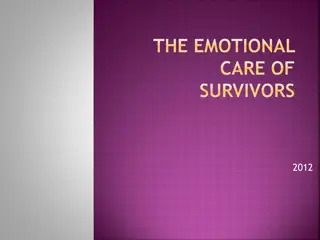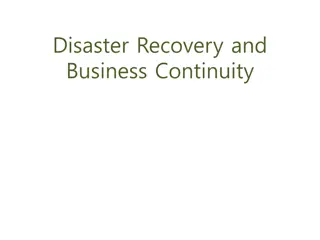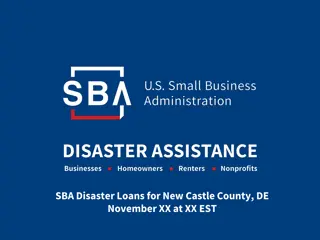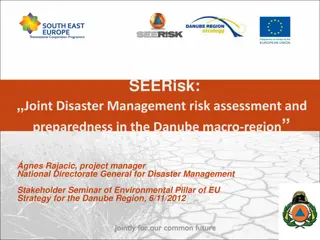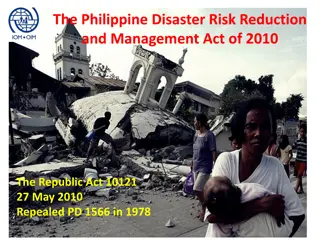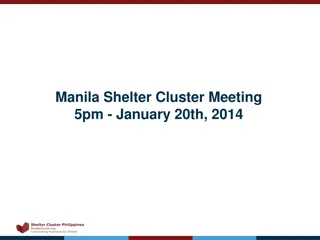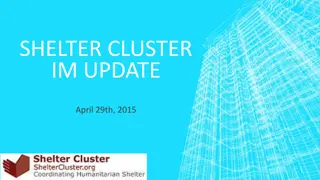International experience in the field of Disaster-related Statistics
Disaster-related statistics encompass data on disaster occurrences, impacts, risk assessment, and post-disaster assessments. The Sendai Framework for Disaster Risk Reduction and the 2030 Agenda for Sustainable Development set global targets and indicators for monitoring disaster risk reduction. Vari
7 views • 6 slides
Understanding Disaster Management Cycle and Phases
Disaster management encompasses planning, organizing, and implementing measures to prevent, reduce, and respond to disasters effectively. The disaster management cycle includes phases such as mitigation, preparedness, response, and recovery. The aim is to reduce potential losses, provide assistance
4 views • 15 slides
Disaster Management and Local Development Through Devolution
The presentation outlined the importance of disaster management in the context of achieving sustainable local development through devolution. It emphasized the need for effective subnational planning, mainstreaming of disaster risk reduction, and financing for disaster relief. The concept of devolut
5 views • 21 slides
Financial Recovery After Disaster Project: Comprehensive Framework for Community Resilience
This project focuses on financial recovery after disasters through financial counseling, disaster response frameworks, best practice training, and community education resources. It emphasizes understanding disaster risk governance, fostering individual responsibility, and identifying community champ
6 views • 5 slides
Urgent Support Needed: Nepal Earthquake Relief Efforts
A devastating 7.8 magnitude earthquake hit Nepal, causing widespread damage and leaving 2.8 million people homeless. Families are desperate for shelter as monsoon rains approach. Habitat is mobilizing engineers to assess damage, provide emergency shelter kits, and support long-term rebuilding effort
2 views • 16 slides
Disaster Management and Sustainable Local Development Through Devolution
The presentation explores the integration of disaster management into subnational planning for achieving sustainable local development through devolution. It emphasizes the importance of decentralization, mainstreaming disaster risk reduction, urban areas' resilience, and financing for disaster reli
3 views • 21 slides
Disaster Resilience Strategy in Developing Countries Vulnerable to Natural Disasters
The IMF's policy paper highlights key challenges faced by small states in building resilience, such as under-investment and donor support post-disaster rather than pre-disaster. The Disaster Resilience Strategy (DRS) emphasizes three pillars for intervention: post-disaster resilience, financial resi
0 views • 11 slides
Government's Immediate Response to Recent Flood Disaster: Overview and Assessment
Understanding the background and context of the recent flood disaster in KwaZulu-Natal (KZN) and other affected areas, this briefing outlines the government's quick response, including the declaration of a national state of disaster, coordination efforts, and actions taken by various government bodi
1 views • 35 slides
Stakeholders Networking for Multi-Risk and Climate Resilient Disaster Management in Slovakia
This project, funded by the European Union, aims to enhance emergency preparedness and response in Slovakia by addressing institutional capacity, coordination, and technology gaps. The goal is to strengthen risk assessment methodologies, involve various stakeholders, and develop disaster-resilient m
1 views • 5 slides
Evaluating Alternative Shelter Solutions in Puntland for Transitional Housing
Assessing the viability of alternatives to traditional tents as transitional shelter solutions in Puntland, Somalia. Phase 1 of the assessment focused on concerns such as fire, theft, leaks, privacy, ventilation, and heat. The assessment also included ranking different shelter types and analyzing ma
7 views • 8 slides
Energy Efficiency and Post-Disaster Shelter Innovations
Explore the concept of energy efficiency in post-disaster shelter solutions, focusing on methods such as using less energy, sustainable options, and innovative technologies like solar panels and biogas. The discussion also delves into challenges faced in implementing energy-efficient designs post-di
0 views • 8 slides
National Shelter and Non-Food Items Cluster for Iraq - Summary and Data Overview
The National Shelter and Non-Food Items Cluster meeting in Iraq on Wednesday, 24th September 2014 discussed various important agenda items including updates on the SRP process, strategic objectives, overview of cluster projects, types of assistance provided, and targeting vulnerable groups. A total
0 views • 7 slides
Lake Brenton Disaster Mitigation Plan Overview
The Lake Brenton Residents Association plays a crucial role in disaster response with defined responsibilities including being the first responder, securing the area, and coordinating with authorities. The Disaster Mitigation Plan for Lake Brenton outlines roles, organizational structure, procedures
1 views • 20 slides
Support for Earthquake-Affected Population in Rasuwa District, Aug 2015-Apr 2016
Support earthquake-affected population in Rasuwa District with shelter upgradation, material support, cash-for-work, livestock shed assistance, and earthquake-resistant techniques verification. Activities include distribution of shelter kits and tool kits, DRR training, mason training, construction
0 views • 13 slides
Understanding the Role of Psychiatrists in Disaster Mental Health
Disaster mental health involves applying psychiatric skills to aid individuals and communities in recovering from the psychological effects of disasters. This includes readiness, response, relief, rehabilitation, recovery, and resilience phases. Mental health professionals play a crucial role in ide
0 views • 30 slides
Shelter Working Group Meeting - Providing Relief and Recovery Solutions for Flood-Affected Communities
The Shelter Working Group Meeting aims to discuss strategies to provide safe shelter to flood-affected individuals through emergency provisions, household support, relocation assistance, and technical guidance. Objectives include delivering shelter kits, household NFI kits, transitional shelters, an
0 views • 11 slides
Role of Department of ICT in Disaster Risk Reduction in Bangladesh
The Department of Information and Communication Technology (ICT) in Bangladesh plays a crucial role in promoting the use of ICT for disaster risk reduction. Bangladesh faces numerous catastrophic hazards, making it essential to utilize ICT for warning systems, relief management, and post-disaster ac
0 views • 16 slides
Health Impact Assessments for Natural Disaster Recovery
The study examines the status of knowledge related to health impact assessments for natural disaster recovery, emphasizing the importance of considering the long-term health impacts of disasters. It highlights how disasters and recovery actions can have lasting consequences on community health and w
0 views • 10 slides
Environmental Impact Assessment and Recovery Planning After the 2010 Chile Earthquake
The presentation discusses the Rapid Environmental Impact Assessment (REA) process conducted by a team of Chileans post the 2010 earthquake. It emphasizes the incorporation of assessment results into post-disaster recovery planning to address key issues such as disaster debris management, transition
0 views • 6 slides
Organisational Structure of Vietnam Red Cross Society in Disaster Preparedness and Response
The Vietnam Red Cross Society has a structured organizational setup for disaster preparedness and response, including the National Headquarters, Disaster Management Department, and various functional departments at different levels. The organization has achieved significant results in disaster manag
0 views • 6 slides
Red Cross Shelter Partnership Initiative in Missouri
The Red Cross supports a Faith-Based Organization (FBO) Initiative in Missouri, inviting organizations to assist primarily in sheltering efforts for disaster response in the community. The National Shelter System shows numerous Red Cross shelters in Missouri, with advantages to partnering with the R
0 views • 16 slides
Global Initiatives for Disaster Risk Reduction in Gandhinagar
The Disaster Risk Reduction Working Group (DRRWG) in Gandhinagar, Gujarat, is focusing on priorities such as early warning systems, resilient infrastructure, financing, disaster response, and recovery. There is a strong emphasis on the connection between disaster risk reduction and sustainable devel
0 views • 18 slides
Unconditional Right to Shelter in Poland: A Look at Shelter Services and Structures
In Poland, the right to shelter was addressed through an amendment in 2015, focusing on various types of shelter services like warming-up stations, overnight shelters, and hostels. The introduction of an open-door policy for basic services marked a significant change. Different shelter typologies we
0 views • 17 slides
Integrating Disaster Risk Reduction into ICH Inventorying for UNESCO
Learn how to apply a community-based approach to inventorying and safeguarding intangible cultural heritage within the context of disasters. This presentation offers frameworks, tools, and exercises to integrate disaster awareness into ICH inventorying and safeguarding practices, emphasizing the imp
0 views • 15 slides
Rehabilitation Disaster Relief: Theory, Science, and Practice
Challenges in Rehabilitation Disaster Relief include lack of extensive rescue capacity, rehab resources and management, fund shortages, and uncoordinated implementation. ISPRM-RDRC outlines past and future actions focusing on the NHV model, mobile rehab teams, international rehab databases, rehab st
0 views • 21 slides
Feedback on Shelter Kit Composition and Distribution
Feedback on the composition and distribution of shelter kits reveals that the main items, such as tarpaulins, hoes, spades, and pickaxes, are being utilized effectively for shelter and livelihood activities. Rejected items due to security concerns include plastic rope and nails. There is a suggestio
0 views • 8 slides
Disaster Recovery Operations and Maintenance Overview
Organizations face key challenges in disaster recovery operations, such as widespread disruptions affecting various levels, communities, and suppliers. Prompt reactions and preparedness are essential to navigate through the phases of a disaster recovery plan - preparation, response, recovery, resump
0 views • 48 slides
Building Research Team for Disaster and Funding in Resource-Poor Settings
Disaster research team building is essential for effective disaster management in resource-poor settings. Dr. Onyeaghala emphasized the importance of competent teams in mitigating, preventing, managing, and monitoring health disasters. The workshop in Abuja highlighted the critical competencies and
0 views • 24 slides
Disaster Recovery Plan Audit for Berry College
Berry College's Information Technology Disaster Recovery Plan is a vital strategy to ensure the continuity of IT operations in the event of a disaster. This audit plan presentation outlines the objectives, scope, and responsibilities involved in auditing and maintaining the effectiveness of the disa
0 views • 20 slides
SMAC Tool: Simplifying Carbon Assessment for Shelter Solutions
SMAC, developed by BRE Trust, assists in comparing shelter solutions based on carbon emissions. It allows easy comparison of 4 shelter types on criteria like materials, packaging, transport, and end-of-life considerations. No expert knowledge is needed to use SMAC; simply input shelter components, m
0 views • 21 slides
Disaster Health Information Outreach and Collaboration Projects: Enhancing Disaster Preparedness
This project by the National Library of Medicine aims to improve access to disaster medicine and public health information for the disaster health workforce through partnerships with various organizations across the United States. Seven projects are awarded annually, focusing on enhancing disaster p
0 views • 15 slides
Morgan County Proposed Shelter Model and Displacement Analysis
The content discusses the proposed shelter model for Morgan County, focusing on building-level assessment records, population displacement, average household size, and building characteristics. It also explains the calculations for population displacement due to flooding, emphasizing short-term shel
0 views • 8 slides
Integrating Climate Change Adaptation in Disaster Risk Reduction Module 1
Welcome to the e-Learning module on integrating climate change adaptation in disaster risk reduction. This module covers concepts in disaster risk reduction and climate change adaptation. It is part of a package that includes five modules focusing on vulnerability, disaster risk reduction, climate c
0 views • 29 slides
Supporting Emotional Well-being in Disaster Survivors: Resources and Training
Explore resources from the Missouri Department of Mental Health for providing emotional care to disaster survivors. Learn about stress responses, training programs like Psychological First Aid, and access web resources for disaster readiness. Contact Jenny Wiley, Coordinator of Disaster Services, fo
0 views • 8 slides
Importance of Disaster Recovery and Business Continuity Planning
Disaster recovery and business continuity planning are crucial for businesses to survive major disasters and continue operations. This involves assessing business impacts, creating documentation, and planning for various types of disasters. Failure to plan can lead to significant revenue loss, damag
0 views • 46 slides
Understanding SBA Disaster Loans for New Castle County, DE
Explore the role of the Small Business Administration in disaster recovery through its loan programs for businesses, homeowners, and renters in New Castle County, DE. Learn about the types of SBA disaster declarations, loan programs offered, limits on loan amounts, and details of the recent New Jers
0 views • 20 slides
SEERisk: Disaster Management and Preparedness in the Danube Macro-Region
Joint Disaster Management project SEERisk aimed to assess and enhance preparedness in the Danube macro-region, involving multiple stakeholders in environmental disaster risk reduction. The project, led by gnes Rajacic, Project Manager at the National Directorate General for Disaster Management, focu
0 views • 17 slides
Enhancing Disaster Risk Reduction in the Philippines
The Philippine Disaster Risk Reduction and Management Act of 2010, also known as Republic Act 10121, replaced PD 1566 and introduced a proactive approach to disaster management, focusing on risk reduction and building community resilience. The new law aims to transform and reform disaster response b
0 views • 26 slides
Manila Shelter Cluster Meeting: Updates and Recommendations for Humanitarian Shelter Response
Updates on recent hub meetings in Tacloban, Cebu, and Roxas for strategic planning in the Philippines shelter cluster. Recommendations provided on key issues such as prioritizing activities, contributing to rebuilding efforts, and supporting local government actors. Survey results show contributions
0 views • 26 slides
Shelter Cluster Update: Tarpaulin Distributions and Shelter Assistance Progress
Tarpaulin distributions are ongoing, aiming to reach over 20,000 households. Monitoring, shelter repair training, and kit distribution activities have begun. Requests for shelter assistance are being analyzed, focusing on areas like informal settlements and outer island communities. Maps are being c
1 views • 7 slides



